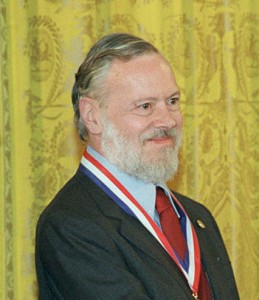Computer science legend Dennis Ritchie died, leaving a lasting legacy of enormous possitive impetus to the global development in the last decades of the XX century.
According to Xeni Jardin of BoingBoing, the news was first made public by Rob Pike via Google+. She wrote:
Taxgedo used the words from Ritchie's seminal textbook The C Programming language to create a word cloud as a tribute, and wrote:
According to Xeni Jardin of BoingBoing, the news was first made public by Rob Pike via Google+. She wrote:
He was the designer and original developer of the C programming language, and a central figure in the development of Unix. He spent much of his career at Bell Labs. He was awarded the Turing Award in 1983, and the National Medal of Technology in 1999.
“Ritchie's influence rivals Jobs's; it's just less visible,” James Grimmelman observed on Twitter. “His pointer has been cast to void *; his process has terminated with exit code 0.”
Taxgedo used the words from Ritchie's seminal textbook The C Programming language to create a word cloud as a tribute, and wrote:
We lost a tech giant today. Dennis MacAlistair Ritchie, co-creator of Unix and the C programming language with Ken Thompson, has passed away at the age of 70. Ritchie has made a tremendous amount of contribution to the computer industry, directly and indirectly affecting (improving) the lives of most people in the world, whether you know it or not.Andygoyap's comparison was even more explicit:
[Isaac Newton] once said he stood on the shoulders of giants. Dennis Ritchie was a giant on whose shoulders people like Steve Jobs stood on.Readers who haven't had Programming 101 with some derivation of C as their first object-oriented programming language during their undergraduate studies might find it hard to grasp the influence of such a modest and private person, who did not flaunt his many achievments nor served as a business icon. For instance, most most modern operating systems such as GNU/Linux and Apple's Mac OS directly descend from UNIX, or that computers running UNIX or GNU/Linux basically provide the infrastructure for the Internet, either as servers or routers, or platforms for running applications like Google search.
….
You don't know him? He is the Father of C, without him Operating Systems (Windows, Apple) wouldn't be here; Games, Programs, Apps on your Apple, Android, wouldn't exist. Many say he is the Father of Computer Science, He has so many achievements…

No comments:
Post a Comment